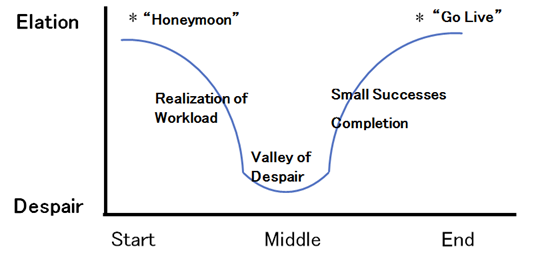This month I spotlight a high stakes war story shared by a Microsoft consultant that really shows the impact of consulting work. If you are a technology consultant, you've heard this question from friends and relatives: "What do you do again?" Sharing war stories is the best way to tell our friends and loved ones -- gosh, even customers -- the magic that goes into keeping the lights on. Which is my segue for this war story from Kaare Boraas, a Microsoft Dynamics ERP Architect.
Q: Kaare, when I put out the call for war stories, I was told yours was the best. What can you tell us?
A: I've been through many implementations and each one has a story, but the one that stands out is a recent Dynamics AX implementation for a coal mine because if we didn't get the software implemented in time, a major metro city literally would be lights out.
What happened is the owners of a major coal mine supplying power for a large metro area in Canada, decided they could manage the mine more efficiently themselves and gave the management company notice. This meant they had 180 days to change out everything -- phones, network, computers, printers -- and, most importantly, to pick an ERP (Enterprise Resource Planning) software product, an implementation partner, AND complete the implementation in 180 days.
Q: That's a strict deadline -- what happened if you missed it?
A: Well, the mine feeds the power generation plants. I guess if they missed the deadline, a large Canadian city would be without power. The deadline was in stone. They had 180 days to take over operation of the mine, with no other option. By the time we were engaged, we only had four-and-a-half months.
Q: Now that makes it a war story for everyone involved! How did it unfold?
A: We followed the normal phases for a project. We just did them faster than normal. We had a pretty good understanding of scope of the project before we started the design, but we actually didn't know that coal production was in scope. It seems funny now, since they are, after all, a coal mine. We added that to the scope after the design and scrambled to come up with a solution.
Q: You were working with really tough obstacles.
A: Definitely. We had to go live on time so they could continue producing coal and the province would have power. We couldn't afford to get distracted by little things. The executive committee kept the road clear so we could move at the pace we needed. We were given a lot of freedom -- we proved ourselves quickly and built confidence. They let us do what we needed to do.
Q: What is "The Valley of Despair" I've heard you talk about?
A: This is a simple diagram from an ERP 101 course. Typically, at the start of a project, people are excited. It is something new and they have the opportunity to participate in building a solution to make their company better. As the workload increases, people tend to struggle with issues and decisions and start to have trouble seeing the end. Hopefully, the business starts seeing small successes and can envision how their business processes will work in the system. It is easy to be pessimistic when you're in the valley of despair. No one ever feels ready to go live. A wise man once told me, "The only thing worse than going live is not going live."
I think the Valley of Despair on this project may have been deeper than any other project. In fact the project may have started there. The project wasn't initiated to improve business; it was thrust upon them as they had to replace the ERP used by the management company.
Q: So, did the city power stay on?
A: Yes! And this project won the Microsoft Canadian Impact Award. It was a precarious timeline and the stakes were high, but we had strong leadership, everyone shared a common vision, and we all worked together to succeed.


